Pat Robertson, longtime TV host, religious broadcaster, educator, humanitarian, and one-time presidential candidate died at his home in Virginia Beach early Thursday morning. He was 93.
Perhaps best known for offering prayer and political commentary at the helm of The 700 Club, the flagship program of his media ministry, Robertson’s rise to prominence is rooted in what he called a vision from God to create The Christian Broadcasting Network, which he founded in 1960. A prolific innovator, he also started a Christian university, a legal advocacy group, and an international NGO specializing in disaster relief.
Even while promoting a worldview that believes in the inerrancy of the Bible, both his approach to business and his on-air persona were considered unorthodox by some – if not ahead of his time. Today, his influence and legacy crisscross interests and industries that have broken barriers for countless Christian leaders and laypeople.
Born Marion Gordon Robertson in Lexington, Virginia on March 22, 1930, the nickname “Pat” was given to him by his older brother. Sticking with that moniker rather than his birth name was just the first of many conventions he would defy during his lifetime.
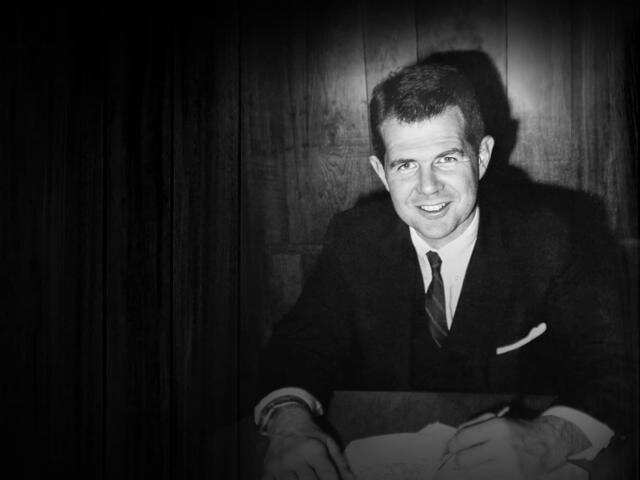
The Yale-educated lawyer and son of a U.S. senator, Robertson had hoped to become a successful businessman. In his 1972 autobiography, Shout It From the Housetops, he wrote about his dream of living the life of a New York socialite. But his path took a decidedly different turn in the 1950s when he became a born-again Christian.
“Deep in my heart, I heard (God) speaking to me about the television ministry: ‘Go and possess the station. It is yours.'” – an excerpt from Robertson’s autobiography, Shout It From the Housetops
Robertson abandoned his own dream and accepted what he saw as God’s plan: to start a ministry in Christian broadcasting. But his launch as a religious broadcaster came with challenges, starting with little capital and a dilapidated TV station for sale in Portsmouth, Virginia.
“He had no money to speak of, and he decided the Lord wanted him to have that station,” recalled Greg Laurie, pastor of Harvest Christian Fellowship in Riverside, California. “When it was all said and done, Pat got it for free. So that means not only did he have faith, but he was a good negotiator, too.”
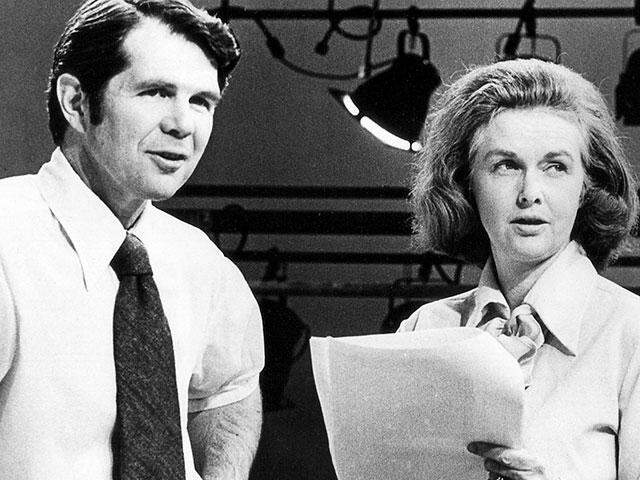
In 1960, after moving his wife and kids to Virginia, he created what would become The Christian Broadcasting Network with no more than $70 to his name and a company bank account with a meager $3 initial deposit.
Those humble beginnings, predicated on vision and seeds of faith, eventually grew into a global media ministry that would reach hundreds of millions of people across six of the seven continents.
In 1966, Robertson began hosting a daily talk show, The 700 Club. Still on the air today, it is one of the longest-running programs in television history.
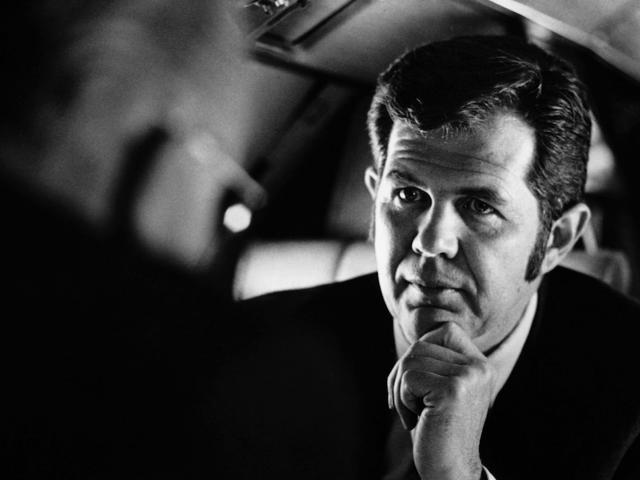
From the set of The 700 Club, he transformed Christian television. But his reach went far beyond spirituality.
By the 1970s, Robertson – who once described himself as a “newsman” at heart – had secured interviews with military and political leaders such as the late Yitzhak Rabin, Israel’s prime minister, and Jimmy Carter, who was then Georgia’s governor and would win the White House with the support of evangelical Christians.
Four years later, Robertson was part of the conservative leadership that helped propel Ronald Reagan into the White House in 1980.
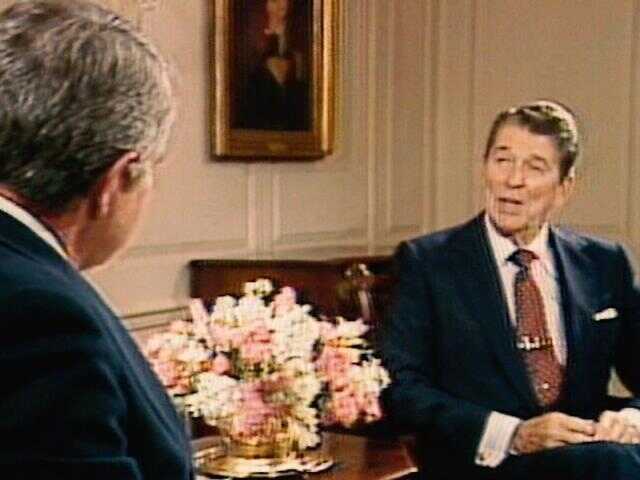
By 1988, Robertson ran for the presidency himself – stunning the political world with his second-place finish in the Iowa caucuses.
“He shattered the stain glass window,” reflected Bishop T.D. Jakes, pastor of the Potter’s House in Dallas. “People of faith were taken seriously beyond the church house and into the White House.”
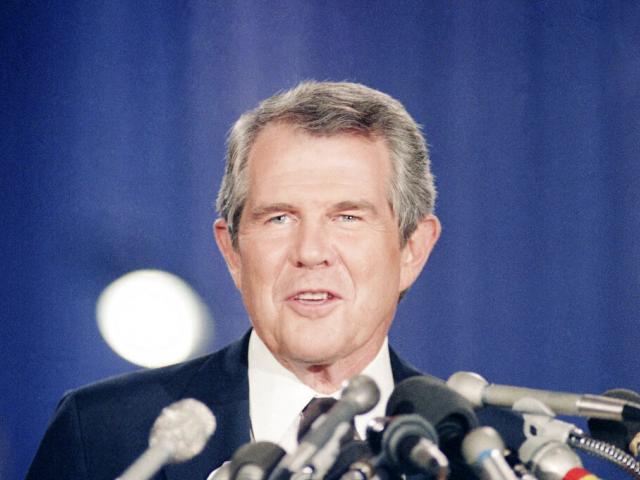
Rev. Pat Robertson in October 1986. (AP Photo)
Although he lost the 1988 Republican nomination to George H. W. Bush, Robertson’s candidacy changed the face of American politics.
“When you think of Pat Robertson, I think one of the major lessons you learn is that if you have a dream, go after it. Even if you fall short of it,” Bishop Jakes continued.
He expanded his political influence by bringing thousands of evangelicals into the electoral process through the founding of the Christian Coalition. He also created the American Center for Law and Justice with a mandate to protect religious freedoms.
“Pat always had this vision to go where a lot of people don’t go. When you do that, sometimes you’re criticized by people,” Pastor Laurie said. “He’s been a risk taker in the best sense of the word. A visionary. A dreamer. But someone whose message was the Gospel.”
With his return to CBN after the failed campaign, Robertson took the company globally, dramatically extending the reach of the ministry’s Christian programming to over 150 countries in more than 100 languages through satellite technology.
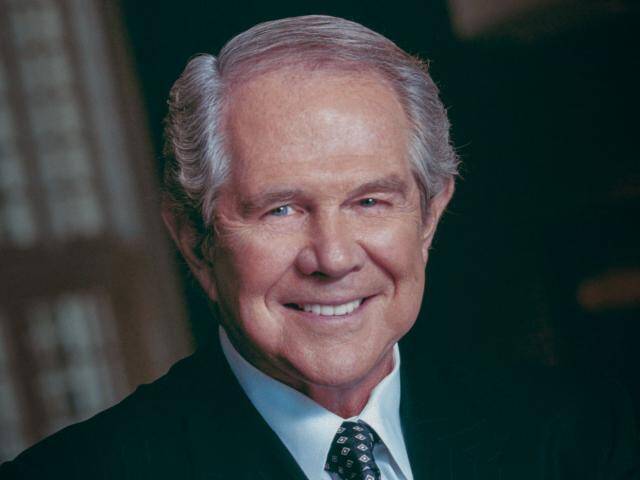
Throughout his career, his influence was measured, in part, by his social and political commentary – which garnered both praise and criticism.
“I was always impressed with his boldness,” commented Franklin Graham, son of the late Rev. Billy Graham. “He did it in a nice way. He wasn’t offensive, but he spoke truth. And that offended people – when you speak truth. But that’s ok.”
A trailblazer, he invited Ben Kinchlow, an ordained African Methodist Episcopal Church minister, to serve as a co-host in the 1970s. Kinchlow, who died in 2019, often acknowledged the decision was made during a time when “you don’t see a lot of African Americans on TV.”
Robertson also defied objections to hiring radio DJ Scott Ross, whose interracial marriage to former Ronettes singer Nedra Talley drew criticism from some corners in the 1960s South.
“I didn’t think of myself as much of a pioneer. I just knew that whatever the prejudices of the day, we were not going to submit to any of them. . .I believe the Bible had instructed that whether rich or poor, male or female, African American or white, we all were one in Christ Jesus.” – an excerpt from Robertson’s I Have Walked With the Living God.
While his commentary was no stranger to news headlines, what often went underreported was his humanitarian efforts.
In 1978, he started Operation Blessing, a Christian-based humanitarian group specializing in disaster relief, hunger aid, clean water, and medical care. The ministry has delivered hundreds of millions pounds of food and helped millions of poor and needy people in every corner of the planet.
“Raw Christian compassion” is how the late Jack Hayford described the ministry’s impact. “That’s been fairly low-profile. Globally, it’s been powerfully impacting,” he said before his passing in January 2023.
***For more information on the life and ministry of Pat Robertson, please visit CBN.com/Pat. To watch his biblical teachings and learn about the God he loved and served, visit CBNfamily.com. In lieu of flowers, the family asks you to visit CBN.com/HonorPat to make a memorial gift.***
Robertson maintained strong relationships with fellow evangelicals, including Billy Graham. In 1989 after the fall of the Berlin Wall, the Christian broadcaster joined his friend and well-known evangelist for ministry outreaches in several former communist countries.
CBN, at Robertson’s direction, supported thousands of churches across central and eastern Europe, including in Ukraine and Russia. He also made inroads in Asia, securing broadcasting agreements and humanitarian outreaches in China.
Generosity was a core conviction throughout his career and was often made evident in his support of other ministries, including Samaritan’s Purse – started by Graham’s eldest son, Franklin.
“Pat Robertson invested in other people and other ministries. A lot of people don’t do that,” explained Graham, CEO of Samaritan’s Purse and the Billy Graham Evangelistic Association. “Pat invested in other people. He invested in my life.”
Robertson’s reach extended to the Middle East, where he ran a television network reaching out to Arabic-speaking audiences. He also boldly stood with Israel, even in times of war.
A renaissance man, he was a New York Times bestselling author exploring spiritual how-tos, finance, and even fiction. He also heavily invested in education.
“One of the things I appreciated about Pat Robertson was that Pat always had a sense of the world in mind to permeate all of life. I think that’s why God led him to start Regent University,” said Bible teacher and longtime friend Kay Arthur.
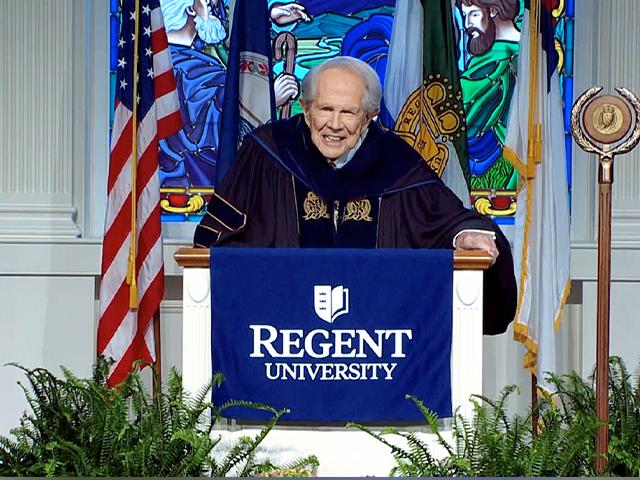
Robertson served as chancellor of Regent University, a Christian college he founded in Virginia Beach, VA in 1977, whose motto is to produce “Christian leadership to change the world.”
In his later years, he suffered several health setbacks, including a horseback riding accident in 2017 and a stroke in 2018. He showed his resilience by returning to the set of The 700 Club ten days after his embolic stroke on February 12, 2018.
“I’m kind of like an old car. They just keep putting parts in,” he joked during his televised appearance describing his pacemaker.
In October 2021, Robertson announced he was stepping down as a daily host – coinciding with the ministry’s 60th anniversary. However, even after retirement, he frequently made monthly appearances fielding a range of questions and topics from viewers.
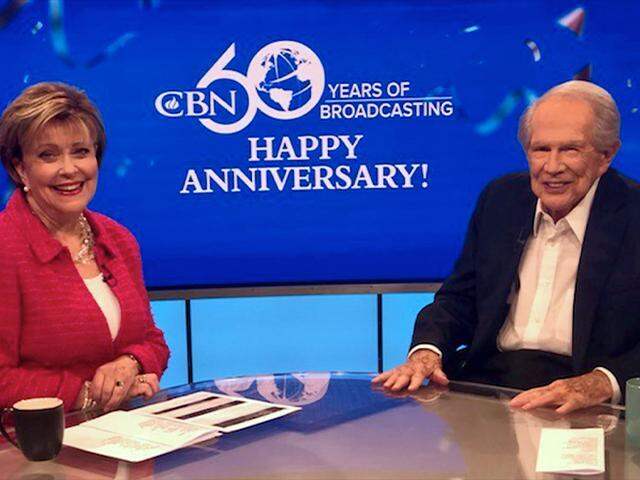
“What really makes him a giant is that he never pointed toward himself – but to the cross,” Jakes said.
Despite his declining health and losing the love of his life in April 2022 – Dede, his wife of nearly 70 years – Robertson’s faith, obedience, and love for God never wavered.
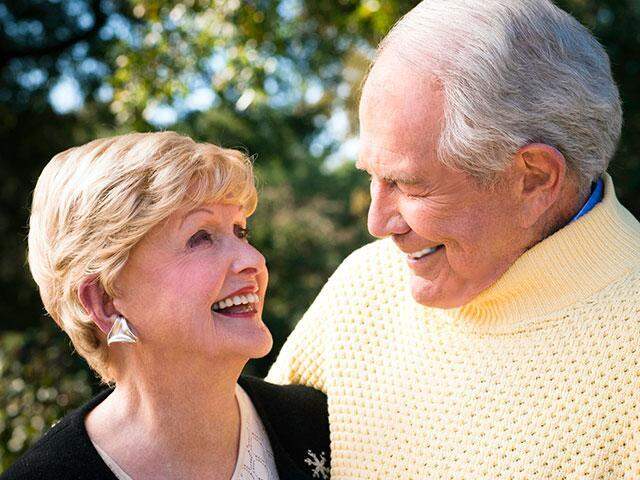
Left to cherish his memory are his four children Tim, Elizabeth, Gordon, and Ann; 14 grandchildren; 24 great-grandchildren; and thousands across the CBN family of domestic and international ministries.